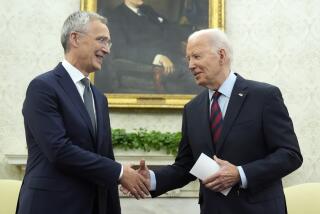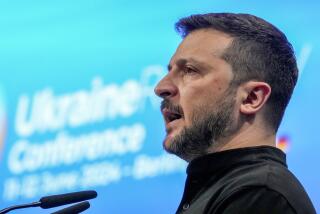Stubborn and Determined, Poles Will Challenge Again
- Share via
Another round of strikes has come and gone in Poland--with neither side winning or losing.
Solidarity, the still-banned labor union, is down but not out. The reputation of its leader, Lech Walesa, has been tarnished. Yet it is still only a question of when Polish workers will once again confront the government of Gen. Wojciech Jaruzelski.
The immediate cause of the latest labor unrest was the recent 40% increase in the price of consumer goods and utilities. Ironically, what the government did was both necessary and desirable; bringing prices more in line with the cost of production was long overdue. No economy can function efficiently with the extensive system of state subsidies that Poland has had.
The problem is that such austerity measures, however desirable, require political cooperation between the authorities and the people. As long as most Poles lack confidence in Jaruzelski’s government, they will not make sacrifices for distant economic goals. Their past sacrifices were in vain. Most of the gains they had negotiated with successive Polish regimes in 1980-81, 1976, 1970 and 1956 have disappeared.
This is why the substance of their struggle, obvious differences in methods notwithstanding, has so much in common with the freedom fighters in Afghanistan. The Poles, too, want political change--independence from the Soviet Union and freedom at home. Stubborn and determined, the Poles are not going to give up either.
Contrary to their reputation, Poles are also realistic, perhaps, knowing that the age of empire is (almost) gone. After all, with the disappearance of the British, French and even the Portuguese empires, and with over 160 independent countries represented in the United Nations, the Soviet empire is surely an anachronism now in the age of national self-determination.
The Polish economic reform, which only seeks to trim the worst features of an inefficient economy, is therefore a non-starter. What Poland needs is what Soviet leader Mikhail S. Gorbachev himself told his East European comrades last year to do: “Minor repairs will not be enough. Overhauling is in order.”
There is one Polish leader who at least understands his country’s predicament. He is Mieczyslaw Rakowski; since last December a member of the Polish Politburo. He knows that while his country’s problems are very serious, they are not insoluble.
In a 60-page, unpublished paper written last year and leaked to British newsmen this April, Rakowski warned his colleagues against resisting change. He suggested that unless the Polish regime “finds the creative energy, courage and imagination to free itself of useless ideas and outdated concepts,” new “upheavals and revolutionary outbursts” will sweep Poland.
Without commenting directly on Gorbachev’s interpretation of the Brezhnev Doctrine, Rakowski seemed to urge his colleagues not to rely on Soviet intervention to protect the communist system. “We must pose the question,” he wrote, “whether all of our comrades in top positions have drawn the right conclusion from the new political constellation that is developing in the socialist camp.”
In fact, Rakowski’s “question” is today’s reality. The Polish regime has not taken advantage of the new political constellation--the Gorbachev phenomenon. Jaruzelski almost certainly has Moscow’s approval now to do what is necessary to stabilize Poland, yet he has refused to take the one political step that could lead to peace and quiet, if not genuine stability in his troubled homeland.
That step is only a phone call away. Despite his deep hatred of Solidarity and the man he calls “that electrician from Gdansk,” the general should legalize Solidarity and talk with Walesa.
Last year, I asked one of Jaruzelski’s deputies why the Polish regime was unwilling to deal with Walesa: “If Gorbachev can reach out to Soviet dissident Andrei Sakharov, why can’t you sit down with Walesa?”
The question was angrily dismissed. Drawing the edge of his hand across his throat, the Polish leader heatedly replied: “Two reasons. That man wants to cut our throat. And he represents nobody in this country.”
Really? It may be that the magic of Walesa’s appeal is on the wane; younger and no doubt more radical leaders are rising. But Walesa still commands both the attention and the affection of most Poles. Surely it will be more difficult and not less to deal with the next electrician from Gdansk or Warsaw or the Nowa Huta steelworks.
The authorities’ resistance to meaningful political change--their deceitful policy of backdown and crackdown--can only further radicalize the Polish people. Must it come to a bloody showdown? Will Jaruzelski ever understand that Poland’s problems, however intractable, are soluble, that economic reform can be made to work if accompanied by a political accord?
More to Read
Sign up for Essential California
The most important California stories and recommendations in your inbox every morning.
You may occasionally receive promotional content from the Los Angeles Times.










